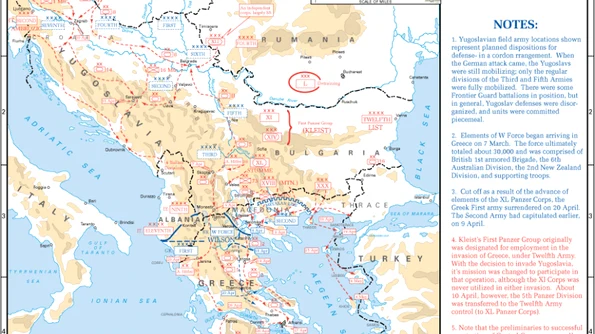
International Relations in the Balkans in the War Years (1940 – 1944)
The Second World War was a general armed conflict amidst the 20thcentury which destroyed a major part of the globe, thus being considered the biggest and the bloodiest continuous war in the history of humankind. In the first part of 1941, the British Army was in Egypt from where it could have immediately come to the aid of Nazi-threatened Greece. UK’s fears of an invasion were not unfounded, since Hitler and the German leadership planned from December 20th, 1940 to invade Greece in an operation entitled Marita.
In 1940, Yugoslavia was the only obstacle in Europe to a successful Nazi intervention in Greece. Hitler tried without success to enlist this last country in the Axis (its most important members were Germany, Italy and Japan. Other states included Romania and soon, Bulgaria). At the same time, Winston Churchill was making efforts to include Yugoslavia in a common Balkan front against Germany alongside Greece and Turkey. However, Yugoslavia was in a very dangerous position, because in February 1941, Germany sent its troops to Southern Romania and on the 1stof March, Bulgaria agreed to the German Army to cross its territory. Thus, Yugoslavia found itself in a military encirclement from the North and East.
On March 2nd, the British ambassador in Belgrade, Campbell, gave Prince Paul a letter which described Yugoslavia’s future situation, if it accepted the German ultimatum ad well as the Greek and Turkish intention of creating a united front against the Third Reich. The UK decided to support the Balkan front. Yet, Prince Paul and the Yugoslav Government decided to reject the British proposition and to negotiate with Berlin a Yugoslav alignment to the Axis (Romania and Bulgaria had already done it). A certain general Simovic from the Yugoslav leadership was the only one against the decision in favour of Germany. Churchill said:“then was the time to take the irrevocable decision of either sending or not the Army of the Nile in Greece.” The British Army reached Thessaloniki on March 8thand it joined a Greek army under the leadership of the English general Wilson.
Hitler invades Yugoslavia
On March 25th, 1941, the Pact of Vienna acknowledged the Yugoslav adherence to the Axis. However, this decision would not last for too long, since general Simovic organized a putsch which ousted the prime-minister who signed the alliance with Germany and forced Prince Paul to abdicate. Simovic became the leader in Belgrade and made use of the public opinion which was totally opposed to Prince Paul’s policy. In Belgrade, the people would chant “better war than a pact, better death than slavery.”
Before too long, Hitler attacked Yugoslavia on April 6th, 1941 by bombing Belgrade and the Yugoslav transport lines. Hitler’s decision meant the postponement of the attack on the USSR. The German Army penetrated Yugoslavia from Styria, Hungary and Bulgaria. April 10thand 12thmean the occupation of Zagreb and Belgrade respectively, while the Italians were advancing on the Dalmatian Coast.
General Simovic resigned on April 14th, 1941 and three days later, general Kafatovic signed the armistice with the Germans which meant the unconditional surrender of Yugoslavia and total submission to the Axis. Germany had a small number of casualties in the war with Yugoslavia – approximately 151 dead, 392 wounded and 15 missing. However, the most important fact about the war in Yugoslavia was that it effectively delayed the Russian campaign with one month. Hitler planned to begin the offensive against the USSR on May 15th;however, at the end of March, he decided to postpone it until June, 22nd.
The Invasion of Greece
Field marshals Kleist and von Rundstedt declared that exactly this delay was the reason behind the inability of the German troops to reach Moscow before winter set in on the Eastern Front. They also explained that some of the tanks had to be repaired after their trip to Thessaloniki, yet there was never time for that. On April 6th, the German troops under the command of field marshal List invaded Thessaloniki. Thus, they created a breach in the British-Greek front with the purpose of encircling the English Army in Thessaloniki. However, the British managed to withdraw in due time, but the Wehrmacht isolated the Greek divisions in Albania by advancing on a South – West direction.
The German Army conquered quite easily continental Greece with the aid of the Stuka aircraft which forced the Greek and British armies to take refuge in Crete. Until then, however, the army in Western Greece surrendered on April 21st, 1941 and on April 24th, Greece officially surrendered to the superiority of the Luftwaffe and Wehrmacht. At the same time, the British Army started to withdraw under the German bombardments. The English fleet of Alexandria with its 6 cruisers and 19 destroyers made possible the withdrawal of 50 000 soldiers.
Hitler feared a British attack on the Romanian oilfields and thus, he decided to send its paratroopers in the airborne Merkur operation of conquering Crete. In the morning of May 20th, 1941 at 8 o’clock, almost 3.000 German paratroopers were launched over Crete which was defended by 56 000 British, Australian, Greek and New Zealand soldiers. The paradox was that although the British had been informed by their agents about a possible airborne German plan, the Wehrmacht managed to conquer an airport which helped other German soldiers to land. Yet, the English general in Crete thought that a German airborne attack was impossible and that the Germans would attack by sea which could be read in his May 5threport to Churchill:“I am not in the least worried by possible airborne attack.”
The Merkur Operation was a success also because of the lack of air force in Crete and the insufficient anti airborne artillery. Of the 27.000 tons of artillery promised for Crete, the British soldiers received only 3.000 tons, since the English ships could not reach the island under the German bombardments. Although Churchill feared an airborne attack and requested an additional 12 tanks to be sent to Crete, the army there benefited from only 6. However, in the evening, the number of the German soldiers doubled and they managed to conquer the Maleme airport where the Luftwaffe was able to land, even though it was still under enemy fire. Thus, because of the British artillery, the Germans lost 100 airplanes.
On May 26th, the British commander in Crete reported that:“In my opinion, the troops under my command reached their resistance limit… our position here is desperate.” The British withdrawal began during the night of May 28thand ended on the 31st. The British navy under the command of Admiral Rawlings managed to save 16.500 soldiers (2.000 were Greek). Also, the British suffered the sinking of 3 cruisers and 6 destroyers as well as the damage of the only aircraft carrier in the Mediterranean-Formidable. 96 other war ships were severely damaged. The German bombardments concentrated on Heraklion – where the soldiers embarked for withdrawal – and in an area up to 150 km to Alexandria which was the destination of the British soldiers.
The Wehrmacht counted 2.000 dead and 4.000 wounded which amounted to less than a third of the English damage, except the Greek ones. However, the 2.000 Germans dead were among the elite of the German forces. Field marshal List organized a successful Balkan Campaign similar to the Polish and French Campaigns which destroyed the enemy troops.
After the war, the high commander of the German Airborne Forces general Student declared that Hitler was not too easily convinced to use paratroopers in the offensive against the island of Crete. Churchill thought that the Germans used their airborne troops in a useless battle.















